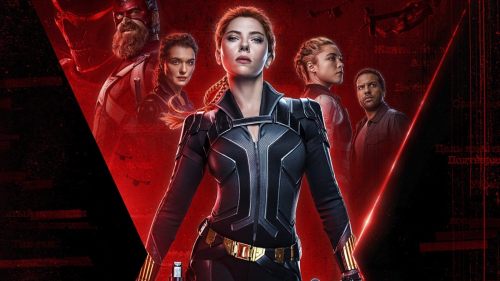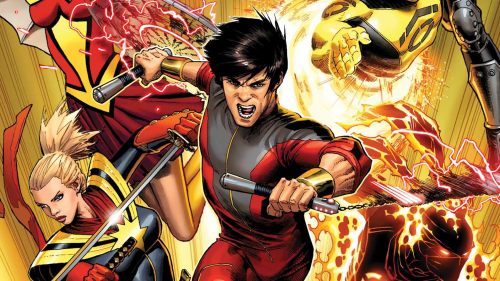Marvel’s RUNAWAYS: A Character-Driven Departure
Runaways (2003) by Brian K. Vaughn and Adrian Alphona is a propulsive read. A mile-a-minute plot that yanks its young characters into adulthood by making them, well, run away as the title suggests, from none other than their own supervillain parents. By issue one, they’ve discovered a secret lair. By issue two, they’re on their way out the door. It’s a breeze of a comic, hitting every “Young Adult” beat you’re familiar with, only well before “Young Adult” was in vogue. Runaways (2017) however, its live-action adaptation on streaming platform Hulu, is a velociraptor of a different colour. Where the original felt like a matter of circumstance, tapping in to the sudden cultural shift that was the early 2000s (I trust I don’t need to describe the era, or the attack that shaped it), this new version arrives at a moment where the dread feels sustained, like there’s a dark cloud hovering over an entire generation.
The series focuses on the same leads as the comics: the intellectual Alex, the wiccan Nico, the tech-savvy Chase, the luminescent Karolina, the opinionated Gert and the youngest of the group, the supernaturally strong Molly. There are minor changes made to the characters themselves – Molly Hayes is now Molly Hernandez; she was adopted by Gert’s parents after the death of her own – but the departure that colours the entire texture of the show is the nature of their relationship. Where the old versions were acquaintances who got together during their parents’ secretive gatherings, these six kids were once best friends. In fact, there used to be seven of them, and the seventh member’s death two years prior slowly drove a wedge between them.
This Runaways features a similar plot – a group of children stumble onto their parents amidst a villainous ritual sacrifice before discovering their own unique skills & abilities, and their parents suspect them of having seen something – but the plot does not drive this series. Rather, it’s the character dynamics and the question of whether or not these disparate elements, children who were once thick as thieves but have now been pulled apart during a pivotal period of adolescence, can find their way back to one another when dealing with unimaginable horrors. Unlike the comic, the show isn’t interested in having them live up to their title right away. Three hours into its first block of episodes, and they’re still living under their respective roofs… and it’s the most riveting television Marvel has ever produced.
An appeal of the comic that finds itself mirrored in the show is its Los Angeles setting, a departure from all of Marvel’s cluttered New York happenings. The backdrop features heavily in concept during its opening credits, a distinctly “prestige TV” b-roll montage of objects and skylines that speak to the series’ ideas and locale. More pertinently, they speak to a specifically Angelino aloofness, both the physical and emotional distance that find themselves the center of attention. The death of seventh Runaway Amy (revealed early on to be Nico Minoru’s sister) has pushed everyone apart. Alex Wilder, the comics’ turncoat, is a much more straightforward character, but he starts out where his comic counterpart left off: in need of redemption.
Alex was the only one who didn’t make it to Amy’s funeral, turning Nico, the friend he’s most fond of, into his bitter enemy. Alex hides in his video games, stewing in his guilt. Nico hides from her parents behind layers of makeup. Karolina Dean hides behind a smile (and behind the pristine PR concoction that is her mother’s super-church) while Chase Stein hides from his abusive genius father by hitting the gym, and sisters Gertrude Yorkes & Molly Hernandez hide within age groups they don’t belong to. Gert is a social activist who uses buzzwords she doesn’t have context or lived experience for, while Molly is a self-infantilized orphan who still wears kitty hair-pins and acts like she’s eight (despite being thirteen and on her first period) for fear of losing the only part of herself that was ever connected to her parents. Right from the get-go, Runaways throws some heavy shit at these teenagers, and it only gets heavier when it moves to their parents.
The Pride may actually be the most interesting part of the show. Where the first episode follows the kids up to their discovery of the sacrifice, the second doubles back so we can spend a day with their parents. The Wilders are affluent African Americans steeped in largely white high society, and like their son Alex, guilt is a central force in their story. Geoffrey Wilder for instance is still haunted by the neighborhood he left behind, personified by an old friend and gang member stalling Geoffrey’s land development until he pays “taxes” for what the project will take out of the local economy. He’s being extorted by his roots, and made to wonder if he turned his back on them.
Since Amy’s passing, Nico’s pharma exec parents Tina and Robert have been walled off from one another – at times literally. Tina is a witch, and at one point she even uses her staff to build a barrier between herself and her husband. They’re working on rekindling their marriage now that this, their supposedly final ritual sacrifice (for reasons that aren’t quite clear yet), is behind them. But they’re doing it only on Tina’s terms, and Robert is engaged in an affair with Chase’s mother Janet, whose role in her own household is little more than a support system to her reclusive, time-travel obsessed husband Victor.
The Deans are no longer actors as they were in the comics – in fact Frank Dean is now a former teen heartthrob, but he gave up his fame to help his wife Leslie found the Church of Gibborim, which finds stray and homeless teens and gives them a new life (before “promoting” some of them in the form of The Pride’s mysterious sacrifice). The major change here is that Leslie is the one pulling the strings in The Pride and Frank is blissfully unaware of its true nature, making him an unwitting parallel investigator to the children’s sleuthing. It’s unclear if the show will go down the same route as the comic to explain Karolina Dean’s abilities – Molly is still super strong despite not being a mutant, so anything’s possible – but the removal of her Church’s signature bracelet does result in a sort of light-show where Karolina herself is the source.
The soul of The Pride however is the team of Dale and Stacy Yorkes, bioengineers who work for the Minorus and don’t feel like they belong. They’re weirdos on their own wavelength, standing out at the classy Pride parties by bringing wheels of homemade cheese and dropping fun facts about herbs nobody has heard of. They also have hearts of gold. The Hernandez’ were their best friends, and taking Molly in after their death makes them all the more lovable. More than anything, they serve to truly paint the whole Pride idea with shades of grey. They don’t like hurting people. They’re creators – they even engineered a telepathic dinosaur just for their daughter! – and they’d rather their big scientific breakthroughs be donated to the government than sold for profit. The fact that they’re involved in ritual sacrifice weights heavier on them than it does the others. It’s in creating these lovable goofs and placing them alongside other, more complex “villains” that the nature of these sacrifices come to light – not their purpose per se (the show is going to take its time with its reveals), but rather the fact this group of philanthropists, otherwise ethical and well-meaning, either have no choice in the matter, or see it as some sort of greater good.
The third episode plays like a combination investigation/cover-up, giving equal time and weight to the child and adult characters in a secretly knowing cat & mouse game. The older kids must jump back into being chums despite being driven apart (the various crushes and jealousies don’t help – Alex likes Nico, Gert like Chase, Chase likes Karolina and Karolina figures she might like girls), but the simultaneous discovery of powers and legacies throws another wrench in the wheel. Nico investigates her mother’s mystical staff and figures out she can use it too, though she can’t quite control it yet and she makes it snow indoors. Molly must escape both Catherine Wilder’s inquisition about her whereabouts on the night of the sacrifice, as well as the confusing combination of menstruating for the first time, and the manifesting of stress-induced super strength that tires her out with a quickness. It may not be “mutation” in the X-Men sense anymore, but it does more than just pay lip service to the whole powers/puberty dynamic.
As the kids deal with the creeping realization that their lives are a lie, The Pride must also face the jeopardizing dishonesty within their ranks, as both groups remain wary of one another while trying not to assume the worst. The kids know and the adults suspect them of knowing, but who’s going to play their cards first? When are these Runaways going to run away, exactly? Soon perhaps, though I don’t think it matters. The fourth episode arrives next week and the season is just ten episodes long, but for all I care, they can abscond in the final scene of the season. This is Marvel’s best show since Jessica Jones (and really, its only good show other than Jones and Agent Carter), and the driving force behind it is well-rounded characters whose simple motivations (despite mysterious circumstances) force them into ethical and personal dilemmas. What little mysteries the show contains unravel at a consistent rate, so even if we’re headed for some late-in-the-season twists or cliffhangers, chances are they’ll be built up to with the reveal of more and more information, delivered almost exclusively as dramatic dialogue with specific intent.
Runaways is a show where exposition feels crucial because of how closely tied it is to character development, and it’s one where the setups of these living, breathing characters yields the desire to see them interact in all possible permutations while acting in self-preservation. It’s a far cry from the comics but it flies out the gate with its own unique identity, establishing its reason for existing right up front as it makes teenage drama feel dangerous, grounding its tale of cults and magic and supernatural abilities in the simplest of dynamics: kids and parents keeping secrets from one another to the point of self-detriment.


